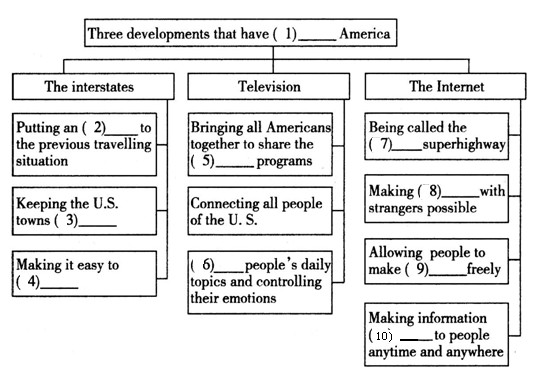请认真阅读下列短文,并根据所读内容在文章后表格中的空格里填人最恰当的单词。
注意:每空格1个单词。
American life before 1950 felt nothing like American life feels now, and a big reason is those three
changes that took place in the second half of the 20th century, which has had the most lasting impact
on our lives today.
1. The building of the interstates (州际公路).
2. The covering of the United States with coast-to-coast television.
3. The introduction and spread of the Internet.
Before the interstates were constructed, even a trip within an individual state often took considerable
planning; two-lane roads, dangerous and slow, were common. The interstates tore down the invisible
walls around U. S. towns. President Eisenhower was in favor of building the interstates, because he
believed that, in a time of war, they would be helpful in moving troops and supplies. But their immediate
effect was to make Americans feel that certain doors had been unlocked. With the interstates came a sense
of freedom: A person could drive anywhere- everywhere-easily. Suddenly, horizons were unlimited. "Local"
didn't mean quite the same thing it used to. Getting away was effortless.
The introduction of national television meant that for the first time in history, people in every corner of
the country were watching exactly the same thing at exactly the same moment. It connected the country,
in a way that even network radio hadn't accomplished, and it was because of the quality of the TV pictures.
As with the interstates, coast-to-coast television was a cure to separation. Those who ran the newly formed
television networks had an enormous amount of power. Their decisions about what to put on the air determined
what people would be talking about the next day. They controlled what people would laugh at and when, what
people would cry over and when, what would anger people and when it would anger them.
And then, later in the century, the Internet came along, erasing all symbolic borders. If the interstate
highways had allowed physical freedom, the Internet allowed a different kind of freedom, one unprecedented
(空前的) in human experience. It was no coincidence that it was initially referred to as the information
superhighway: Seemingly overnight, the knowledge of the world was available to anyone with a keyboard and
a modem; people who had never met and would never meet could communicate as if they were lifelong friends.
Now the individual at his or her computer terminal was given the power to decide how he or she would be
informed or entertained at a given moment. No one else had the absolute authority to arrange the individual's
life; he or she made that decision, moment by moment. What in the past might have taken a person a lifetime-
searching for mankind's recorded wisdom in distant and magnificent libraries- now, in theory, was available
with a series of key taps from one's room. What had once seemed unbelievable had, very quickly, become
routine.
The three developments ended up changing our daily world greatly; largely because of them, it is a world
that would be almost unrecognizable to our grandparents and great-grandparents.

1. changed/affected/influenced/impacted on/upon 2. end 3. connected/linked/joined 4. drive/travel 5. same
6. Determining/Deciding 7. information 8. communication 9. decisions/choices 10. available/accessible
